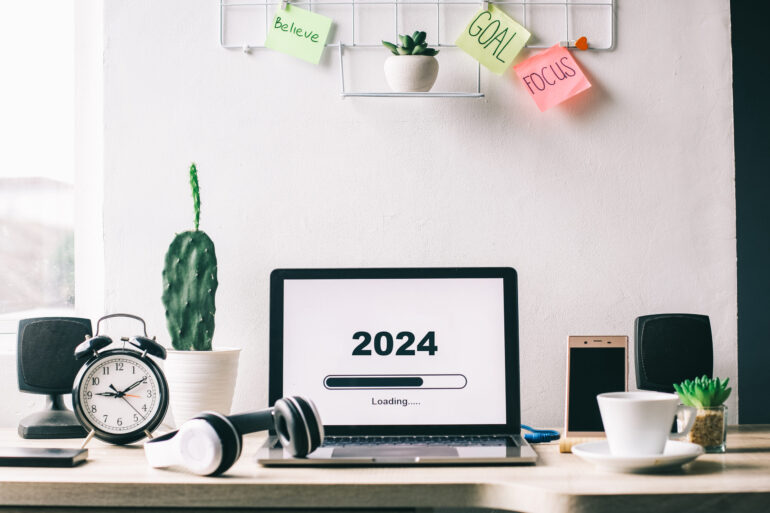Table of Contents
As we prepare for the new year, the ever-evolving landscape of technology calls us toward a future that promises innovation, transformation, and groundbreaking advancements. In this era of rapid technological progression, the only constant is change. From artificial intelligence and augmented reality to operability between devices and systems, and sustainability, the possibilities seem boundless. The convergence of these technologies is poised to revolutionize industries, disrupt conventional norms, and redefine the way we live, work, and connect with the world. The relentless pace at which technology has shaped our lives shows no signs of slowing down, and as we usher in 2024, it’s time to peer into the crystal ball of the digital realm and predict the trends that will define the coming year.
Environmentally Sustainable Technology
In 2024, the momentum of sustainable technology will persist, driven by the ongoing commitment of nations and corporations toward achieving net-zero goals. Individuals, recognizing the urgency of environmental preservation, will increasingly harness technology to mitigate ecological impact. For example, the popularity of electric vehicles, bicycles, and public transportation will continue to expand, reflecting a growing preference for eco-friendly modes of transportation. Additionally, sustainable practices implemented company by company (including leaders like Apple and Google) hold the potential to propel us toward a shared future where technological innovation becomes a force that not only mitigates but perhaps even reverses the effects of climate change. It is in the embrace of innovation and the courage to move forward that we find the keys to unlocking a sustainable future.
Increased Operability Between Devices
Apple has announced plans to introduce RCS support for iPhones in 2024. This game-changing move not only signifies a truce in the age-old rivalry between Android and iPhone users but also marks a significant step toward increased operability between devices. No longer will users on either side of the smartphone divide need to endure the frustration of subpar group texts and low-quality videos. This opens the door to a new era of seamless communication. Beyond smartphones, the prospect of improved interoperability extends to other device ecosystems, such as Android users with MacBooks yearning for smoother data transfers. The potential for expanded interoperability emerges as a highly anticipated tech trend for 2024, promising a more connected and user-friendly digital landscape.
The Integration of Robotics and AI Across Industries
The widespread adoption of robotics and AI is reshaping various industries. In medicine, robots assist in surgeries and enhance diagnostics. The automotive sector sees advancements with AI-driven autonomous vehicles, promising safer transportation. Rescue operations benefit from robotic systems navigating hazardous environments and delivering much-needed aid. Across sectors like manufacturing, logistics, and agriculture, the integration of robotics and AI boosts efficiency and innovation. This technological shift signifies a collaborative future for humans and machines, revolutionizing the professional landscape.
Augmented Reality (AR) and Virtual Reality (VR) Smartphone Integration
AI’s integration into smartphones has also paved the way for captivating experiences in the realm of augmented reality (AR) and virtual reality (VR). Through advanced AI algorithms, smartphones can analyze the real world in real-time and overlay digital elements seamlessly. This allows for immersive AR experiences, such as interactive gaming where virtual characters interact with the physical environment. Additionally, AI-driven algorithms enhance object recognition, enabling smartphones to understand the environment and accurately place digital objects. In the VR domain, AI assists in rendering high-resolution visuals and simulating realistic environments, creating an engaging escape from reality. The fusion of AI, AR, and VR transforms smartphones into portals to alternate realities, expanding the horizons of entertainment, education, and beyond.
The fusion of artificial intelligence, augmented reality, and eco-friendly practices not only promises to reshape industries but also offers solutions to global challenges. With a growing emphasis on sustainable technology, improved device interoperability, and the integration of AI into smartphones for augmented and virtual reality experiences, the upcoming year marks a significant leap. One thing’s for sure, technology will continue to be a positive force shaping the way we live, work, and connect with the world.
is a skilled Web Developer and Designer. He builds and designs websites that focus on best UI/UX practices. Justin is also a Verizon Product Expert at Victra, helping customers with Verizon products and services. His mix of design, coding, product, and general knowledge makes him a valuable and knowledgeable team member.





